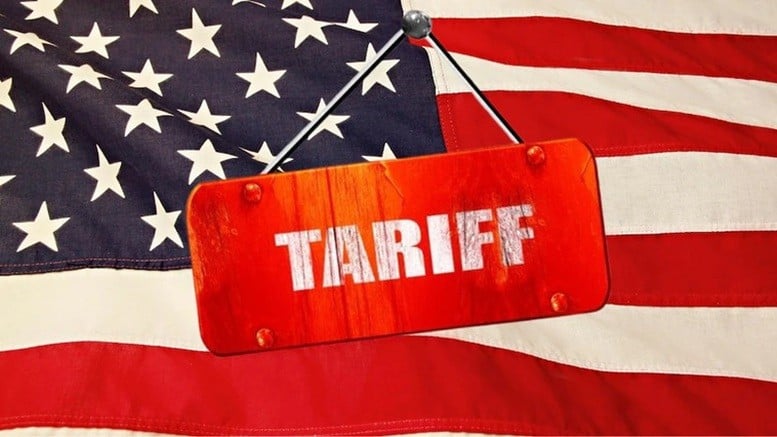
The US reciprocal tariffs for these countries include a minimum of 20% for the Philippines, 25% for Brunei and Moldova, 30% for Sri Lanka, Algeria, Iraq, and Libya, and a maximum of 50% for Brazil.
The move came just two days after President Trump sent a letter announcing new reciprocal tariffs, ranging from 25-40%, to 14 countries.
Similar to the tariff letters first announced by the US leader on July 7, the announced tariffs are not much different from the levels warned in April, but some partners received significantly lower tariffs in this announcement.
President Trump confirmed that the reciprocal tariffs will take effect on August 1, with no extension of the exemption. He stressed that this is a response to "unbalanced" trade relationships.
In addition to tariffs targeting goods from other countries, the US President has also imposed specific tariffs on industries such as steel, aluminum and automobiles. Most recently, on July 8, President Trump announced that reciprocal tariffs would also be imposed on copper and pharmaceuticals.
Japanese automakers respond to US tariffs
As Japan and the United States have yet to reach an agreement on US tariffs on imported cars, leading Japanese corporations are considering raising prices to offset higher costs, as well as preparing response plans in case market demand declines.
In a letter on July 7, President Trump announced a 25% tariff on imports from Japan starting August 1, up from the previous rate of 24%. This reciprocal tariff does not affect the sector-specific tariffs already in effect, such as those on cars, auto parts, steel, and aluminum.
Mr. Hiroki Shibata, CEO of S&P Global Ratings, commented that automakers, especially those with low sales or in management crisis, will have no choice but to increase car prices.
Toyota, Japan’s largest automaker, is seen as less affected by the steady demand for hybrids in the U.S. However, the company still recorded a profit drop of up to 180 billion yen ($1.24 billion) after just two months of paying the tax. Since July 1, Toyota has increased prices by an average of $270 per car and $208 for Lexus models.
Honda estimates a loss of 650 billion yen in the current fiscal year, even as it tries to attract U.S. customers with its hybrids. Nissan, meanwhile, forecasts a 450 billion yen drop in profit and is restructuring globally, including cutting production and jobs. Mitsubishi has suspended deliveries from U.S. ports and is raising prices on some models by 2.1 percent.
Auto sales in the US could fall to 1 million by 2026 due to rising prices, according to S&P Global Ratings. Cars currently account for about 70% of Japan’s total exports to the US, but trade talks between the two sides have made little progress, dashing hopes among Japanese automakers for a deal that would eliminate or at least reduce the 25% tariff on imported cars to the US.
EU ready for any tax scenario
The European Union (EU) is stepping up efforts to reach a framework trade deal with the US by August 1, focusing on immediate tariff reductions and a commitment not to impose new restrictions. However, these proposals have so far received no response from Washington.
European Commission (EC) President Ursula von der Leyen said on July 9 that the EU is working closely with the administration of US President Donald Trump on a trade deal and is preparing for all possible scenarios.
On the same day, an EC spokesperson also said that the EU is working to complete a trade agreement with the US before August 1, possibly even in the next few days. However, German Chancellor Friedrich Merz said that it is not easy for the two sides to reach an agreement by the end of this month.
Meanwhile, Chairman of the EP's International Trade Committee, Mr. Bernd Lange, commented that the EU is having difficulty gaining concessions from the US, especially high tariffs on steel (50%), cars (25%) and a basic tax of 10% on most imported goods to the US.
In addition, the official also expressed concern about the 50% tariff on copper that President Trump just announced, which will be applied in the near future, in addition to tariffs on semiconductors and pharmaceuticals.
Thailand fears 36% tax will hit exports, jobs
A TTXVN reporter in Bangkok quoted an announcement by the Thai Employers' Confederation (EconThai) expressing concern about the new 36% tax rate that the Trump administration will impose on imported goods from Thailand starting August 1.
EconThai said the tariffs, which are higher than those imposed by the US on Thailand’s regional competitors, would put a huge strain on the domestic manufacturing industry and could have serious consequences for Thai workers. Exporters will be the first to feel the impact, with total export value forecast to fall by more than 50% this month.
Mr. Tanit Sorat - Vice President of EconThai and Chairman of the National Labor Development Advisory Council - predicted that many Thai workers are at risk of losing their jobs and that unemployment could cause impacts that last until 2026.
High tariffs will force manufacturers to reduce output, lay off workers and reduce profit margins due to fiercer competition with other countries in the region.
Previously, the Joint Standing Committee on Commerce, Industry and Banking of Thailand also warned that if the US imposes a 36% tariff, Thailand's GDP growth could fall to 0.7-1.4%, while export turnover is expected to decrease by about 2%.
However, President of the Federation of Thai Industries (FTI) – Mr. Kriengkrai Thiennukul – still expressed optimism that the Thai government could reach an agreement with the US on lower tariffs.
Source: https://baolangson.vn/thue-quan-hoa-ky-them-8-nuoc-duoc-cong-bo-muc-thue-cao-nhat-50-5052828.html



























![[Photo] National Assembly Chairman attends the seminar "Building and operating an international financial center and recommendations for Vietnam"](https://vphoto.vietnam.vn/thumb/1200x675/vietnam/resource/IMAGE/2025/7/28/76393436936e457db31ec84433289f72)








































































Comment (0)